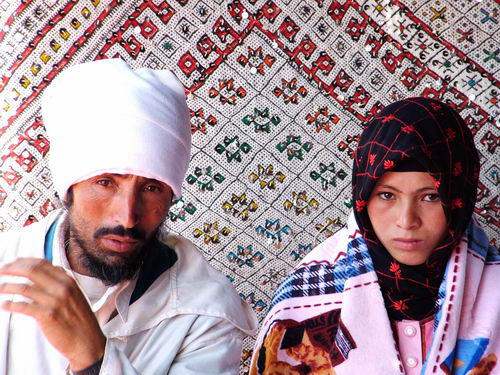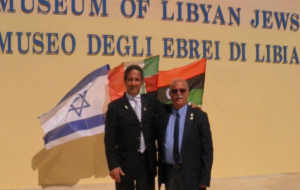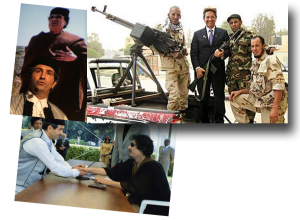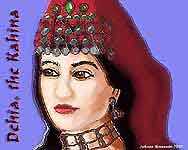David Gerbi to meet with National Transitional Council chairman. Jerusalem Post

Amazigh, the Berbers ... The Amazigh are lost in history but they are the original humans of North Africa. "They belong to a powerful, formidable, brave and numerous people; a true people like so many others the world has seen - like the Arabs, the Persians, the Greeks and the Romans. The men who belong to this family of peoples have inhabited the Maghreb since the beginning. —Ibn Khaldun, 14th century Arab historian, referring to the Amazigh, the Berbers." for more, go this link. http://en.wikipedia.org/wiki/Berber_people The Berbers were maong the few Byzantine peoples t resist the explosive Arab armies after the death of the Prophet. One legend is that the Berber resistance to Islam was led by al Kahina, a Jewish queen (http://en.wikipedia.org/wiki/Kahina).
ROME – David Gerbi, the international relations representative of the World Organization of Libyan Jews, is called “Udai ugrauli” (“the Jewish revolutionary”) by the Amazigh rebel leaders on the Libyan National Transitional Council in the country’s western Jebl Nafusa mountains.
erbi, a Jungian psychoanalyst and Libyan-Jewish exile living in Italy, has been to Libya on several missions over the past decade, driven by a desire to restore the two-millenniumold Jewish-Libyan heritage and return to his erstwhile home as a free citizen. The “Udai ugrauli” proudly displays his three legitimate identities: Italian, Libyan and Jewish. As Gerbi spoke with The Jerusalem Post via Skype from a rebel outpost in the mountains on Friday, gunshots could be heard in the distance.
After a week of volunteer service in the Benghazi Psychiatric Hospital last May, helping to treat victims of post-traumatic stress syndrome, Gerbi decided to cast his lot with the National Transitional Council rebels. He again left Italy and went to Tunis in August, where he met with Fahdel Hshad, an Amazigh whom David Gerbi met at the Benghazi Tibesti Hotel with the other NTC members. Hshad, considered a great though humble leader, has lived exile for over 30 years, having be
en among the first in the opposition to refuse to recognize Muammar Gaddafi. This was his first trip home in three decades. Hshad and other Amazigh NTC members escorted Gerbi to the Amazigh town of Jadu in western Libya where, during World War II, Italian Fascists and others erected a concentration camp that interned 2,600 Jews.
Gerbi was warmly welcomed by the chairmen of town councils, all members of the NTC, respectively: Moussa Younes of Jado, Dr. Mustafa Razabani of Rajban and Tayeb Ahmed of Jefren along with the general population who recalled the good things their grandparents had told them about Jews.
Among many invitations, Gerbi “sat shiva” in mourning the Galiza family (200 members), sitting in a small circle on the floor with everyone eating from one plate.
Gerbi was brought to the Jewish Cemetery where headstones lie in disarray, with a couple of Hebrew inscriptions on fragments. He recited a symbolic Kaddish over candles on a child’s tomb, lighting three candles in memory of the Jewish dead, including approximately 600 interned men, women and children who
The Amazigh National Transitional Council members offered Gerbi the possibility of fencing off the cemetery and restoring the tombs.
They plan to organize an inauguration ceremony three months from now with the presence of a delegation of ten Jewish Libyans to form a Minyan. In return, the Amazigh members of the Libyan NTC will be invited as a pilgrimage delegation to Jerusalem.
“Our two peoples have much in common,” Mahmoud Tabib said. “We want to create closer relations between Muslims and Jews. Without Jews we will never be a strong country.”

- Psychoanalyst and former Libyan refugee David Gerbi (pictured left) met with members of the World Organization of Libyan Jews in Jerusalem and was appointed their official representative in public affairs. The Organization advocates for Libyan Jews to have the possibility of revisiting their homeland to rebuild and restore desecrated Jewish holy sites such as cemeteries and synagogues. Readmore.
He recalled stories of friendships with Jews he had heard from his grandparents and noted the Jewish kinship of names such as Ya’kub (Jacob), Jounis (Jonah), Moussa (Moses), Hannah, Zaccaria etc.
NTC spokesman Salem Badrani aims to “give voice to the voiceless” in the new constitution, inserting guarantees of respect for Amazigh language, culture and education that was repressed and prohibited by Gaddafi. The Amazigh feel they lived an experience similar to that of the Marranos, and have not succeeded in making themselves heard in the past. They now want to become visible, reclaiming full rights to their ancestral identity.
Gerbi plans to go to Tripoli and, with the help of his NTC rebel friends, meet with NTC leader Moustafa Abdel Jalil – who has already received a formal letter from the World Organization of Libyan Jews’s Kahlon naming Gerbi as the organization’s official representative and offering friendship, support, help, reconciliation and an exchange of visits.

